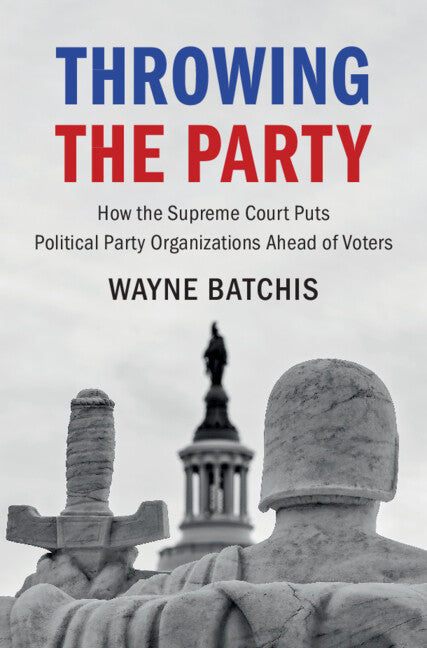Freshly Printed - allow 8 days lead
Couldn't load pickup availability
Throwing the Party
How the Supreme Court Puts Political Party Organizations Ahead of Voters
From primaries to gerrymandering, this book scrutinizes and offers a proposed solution to the Supreme Court's problematic political parties' jurisprudence.
Wayne Batchis (Author)
9781316515051, Cambridge University Press
Hardback, published 30 June 2022
350 pages
23.5 x 15.8 x 2.1 cm, 0.54 kg
'Political parties are private organizations with profoundly public effects. We value their rights of association while recognizing major competing First Amendment interests. Professor Batchis deftly navigates this complicated and important area of law with clarity and nuance, offering a thoughtful way forward as we think about the proper legal framework for political parties in this era of intense partisanship.' Derek T. Muller, Professor of Law, Bouma Fellow in Law, University of Iowa College of Law
The Supreme Court's jurisprudence on political parties is rooted in an incomplete story. Parties are, like voluntary clubs, associations of individuals that are represented by a singular organization. However, as political science has long understood, they are much more than this. Parties are also the voters who choose and support their candidates, the elected officials who govern, the activists and volunteers who contribute their time and energy, and the individual and organizational donors who open their wallets. Unfortunately, the Court's framework for understanding America's two-party system has largely ignored this broader conception of political parties. The result has been a distortion of the true nature of the two-party system, and a body of deeply inconsistent and contradictory constitutional case law. From primaries to campaign finance, partisan gerrymandering to ballot access, law and politics scholar Wayne Batchis interrogates, scrutinizes, and offers a proposed solution to this problematic jurisprudence.
Part I. Foundations: 1. Introduction
2. The Supreme Court's approach to political parties
3. The association versus the individual
Part II. Party Primaries: 4. Setting the stage
5. Primaries and the party in the electorate: the right to vote
6. Double standards: organizations over individuals and major over minor parties
7. Doubling down on the party organization in service of the major parties
Part III. The Party, the Court, and Campaign Finance Law: 8. Party speech through money
9. An ill-fitting party campaign finance jurisprudence
10. Parties and the current campaign finance landscape
Part IV. Passé Equal Protection and a Way Forward
11. Party and equality
12. The political question: is there room for equal protection in partisan gerrymandering?
13. A potential solution: the party system as a public forum
14. Conclusion.
Subject Areas: International law [LB]


